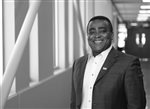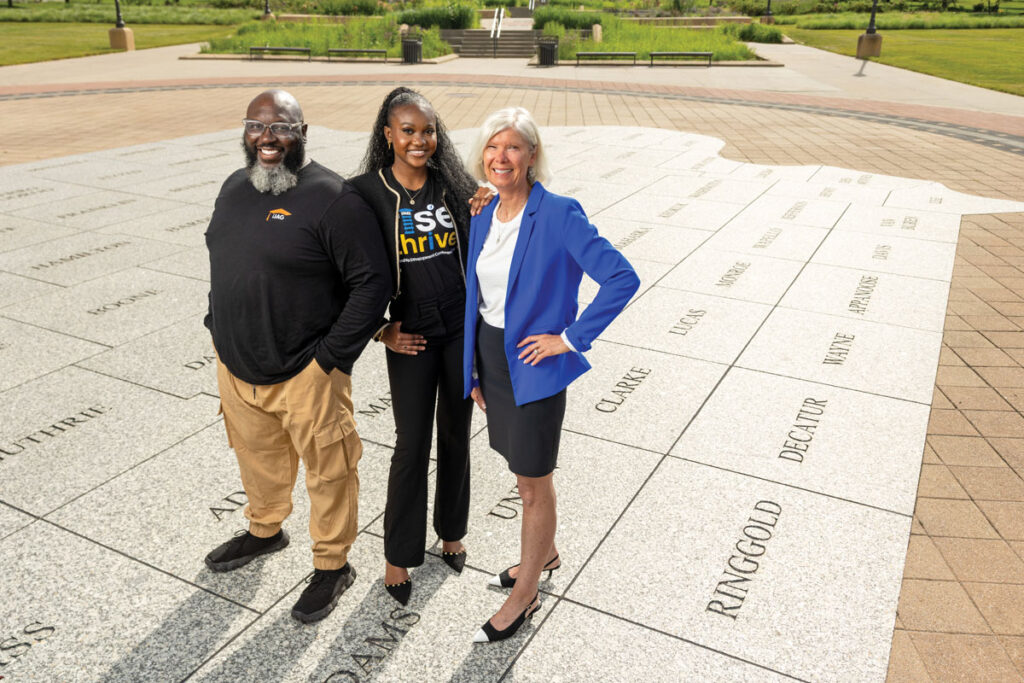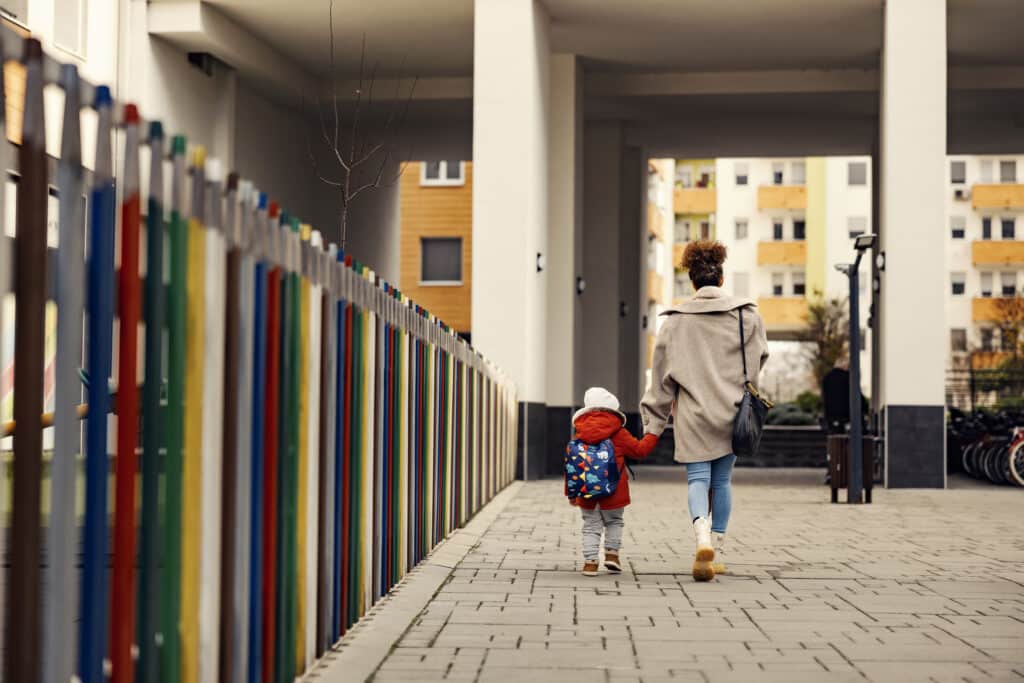A Closer Look: Ahmed Agyeman
Director of community and global engagement, Des Moines Area Community College

Ahmed Agyeman will always remember the positive experience he had when he first visited the Boone Campus of Des Moines Area Community College. It was 1993, and there weren’t many other people on the campus who looked like him. But the Ghana native soon found himself at home at DMACC after a staff member helped him to build a class schedule. Soon he was introduced to one of his prospective faculty members, who personally took him to sit in one of the classes on his schedule. Then a second, and a third. By the time he left later that day he was enrolled as a student and firmly convinced that this was the place for him.
Agyeman, who received his associate degree from DMACC in 1995, went on to earn a bachelor’s degree in sociology from Iowa State University. After graduating he was hired as a service worker in Minnesota, working with refugees coming in from a number of African countries. He later worked in juvenile court services, then returned to Iowa State to pursue a master’s degree in educational leadership while working at ISU in financial aid and academic services. He went on to become assistant director for admissions at Drake University for four years before joining the staff at DMACC in 2004.
He has held a number of roles at Iowa’s largest community college, most recently associate director of program development at DMACC. In 2017, Agyeman completed his doctorate in educational leadership and policy studies at Iowa State. In July 2019 he was promoted to an expanded role as the new director of community and global engagement at DMACC. In this position, Agyeman provides vision and direction for creating and maintaining an inclusive college community and culture across DMACC’s six campuses and six centers.
In the community, Agyeman serves on the boards of Urban Dreams and the Iowa International Center, and sits on the advisory board of the U.S. Committee for Refugees and Immigrants. He also has volunteered as a soccer coach.
What brought you to Iowa originally?
I grew up in Ghana, in West Africa. I came to Iowa to join my mom, who was the director of Outward Bound Intelligence Search. It’s a federally funded program to support students from first-generation, low-income backgrounds. So I joined my mother and brother in Ames, and I was supposed to go to Iowa State. But that just felt really big, and so my mom advised me to start at DMACC. So I attended DMACC Boone Campus. And I was always working — when I was at DMACC I worked at the meatpacking plant; when I was in Ames I worked at the Carriage House. From DMACC, I went to Iowa State to pursue a bachelor’s degree in sociology and criminal justice. I ended up with a major and three minors, because I had a really good adviser who helped me with my schedule and classes.
Did you have a particular career goal in mind as you moved through these positions?
This is a good question, because when I talk to my own children — I have three boys — and other youth in the community I always advise that it does help to have a plan to our goals. Although my parents came to Iowa State and got degrees, they didn’t grow up here themselves. So coming in, I still really felt like an immigrant. I didn’t really get that connection, that mentorship. So really, I just kept going with whatever opportunity was in front of me, with whatever worked. … In each of the three jobs I’ve had since I graduated from college, someone called me and said, “This would be a good job for you; I think you’d be a good fit.”
What does your current role entail?
I’ve been really blessed; I’ve worked with mostly public allies that have come in and done some really wonderful work for us. We have the Gear Up Iowa coordinator, who is working with our first-generation students. I also have AmeriCorps volunteers that work with our Last Dollar Scholar initiative — the governor’s initiative to provide tuition for degree programs that are in high demand. The goal for us having that in our department is to really promote those careers among our underrepresented communities. So we have an access coach, and then we have a success coach. And basically what we do is present [information] to different community organizations about careers that are in demand that are really good-paying that some students or communities may not be aware of. So right now I have three [full-time staff members] and then I have a part-time staff member that is also helping with our diversity, equity and inclusion initiatives.
In what ways is DMACC working to increase diversity, equity and inclusion?
We are currently working on an equity audit, and the plan is by the first quarter in March to have a five-year strategic plan for diversity, equity and inclusion. Part of the structure to get to this five-year plan is we have five workgroups. There’s a student engagement work group — how do we collect data, who’s [represented] here, who’s not here. We have a workplace culture workgroup, which is divided into hiring practices, promotion, training and a lot of other items related to equity and being inclusive. We have a communication workgroup, and we have a community partnership work group also. So we’ve engaged our community partners to find out, are we really reaching out? We have six campuses and six centers — every one of them is very unique [and each requires its own approach].
What was the topic of your doctoral dissertation?
I did a study on adult English language learners in advanced manufacturing and technology programs. I really wanted to understand how they interacted with, how they connected with the colleges, the programs, the faculty members, their peers when they come into college. I got that idea because for my first 10 years at DMACC I was the adviser for our advanced manufacturing program. And throughout that time I did connect with quite a few students who had the technical skill set, but language was a barrier. So when I walked into the building, I would always see them sitting by themselves; I could see that they were not as engaged as other students were. … I thought, this was such a rich opportunity for our native-born students to interact with someone from Bosnia or other countries — it’s just the only space where you can do that. … I spent about two weeks in Illinois interviewing 11 students. I’m actually working with my major professor to publish that in one of the adult education journals.
What civic involvement are you most passionate about?
I did volunteer some with Meals on Wheels and with youth mentorship programs in the past, but I’d say in the last eight years I’ve really focused on family and professional [development]. Two or three years ago, I got an opportunity to finish a community leadership program through Iowa State, and then through that I ended up completing my doctoral program and got recommended to complete the Community Leadership Program through the Partnership. … I’ve known a lot of the work that Urban Dreams has done in the community, so it was an easy decision for me to join the board when I was asked. Beyond that, I’m also on the board of the Iowa International Center. That is also just a passion for me because of my personal background.










